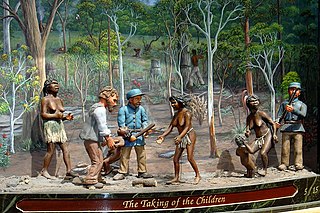
The Stolen Generations were the children of Australian Aboriginal and Torres Strait Islander descent who were removed from their families by the Australian federal and state government agencies and church missions, under acts of their respective parliaments. The removals of those referred to as "half-caste" children were conducted in the period between approximately 1905 and 1967, although in some places mixed-race children were still being taken into the 1970s.
The Children and Family Court Advisory and Support Service (Cafcass) is a non-departmental public body in England set up to promote the welfare of children and families involved in family court. It was formed in April 2001 under the provisions of the Criminal Justice and Court Services Act 2000 and is accountable to Parliament through the Ministry of Justice. Cafcass is independent of the courts, social services, education, health authorities and all similar agencies.

A children's hearing is part of the legal and welfare systems in Scotland; it aims to combine justice and welfare for children and young people. As of 31 March 2020, 8,875 of Scotland's children were subject to a compulsory supervision order.

Child protection is the safeguarding of children from violence, exploitation, abuse, and neglect. Article 19 of the UN Convention on the Rights of the Child provides for the protection of children in and out of the home. One of the ways to ensure this is by giving them quality education, the fourth of the United Nations Sustainable Development Goals, in addition to other child protection systems.

The Children's Court of New South Wales is a court within the Australian court hierarchy established in 1905. The current iteration was established on 18 January 1988 pursuant to the Children's Court Act 1987 (NSW) which deals with criminal offences committed by children aged over 10 years and under 18 years, as well as with proceedings relating to the care and protection of children. The court is located in the Parramatta Justice Precinct.

The Benevolent Society, founded by Edward Smith Hall in 1813, is Australia's first and oldest charity. The society is an independent, not-for-profit organization whose main goals include helping families, older Australians and people with disabilities.

The Children's Court Clinic in New South Wales, part of the Sydney Children's Hospitals Network, is a medico-legal clinic established pursuant to Section 15B of the Children’s Court Act 1987 (NSW) and the Children and Young Persons Act 1998 (NSW) which prepares independent reports on children for legal proceedings before the Children's Court of New South Wales.
The Children's Court of Victoria is a statutory court created in Victoria, Australia. The court deals with criminal offences alleged to be committed by children aged between 10 and 17 and with proceedings concerning children under the age of 17 relating to the care and protection of children.
The Judicial Commission of New South Wales is an independent statutory corporation of the New South Wales Government that provides sentencing information and continuing education to and examines complaints made against judicial officers in New South Wales, Australia.

The Independent Safeguarding Authority (ISA) was a non-departmental public body for England, Northern Ireland and Wales, that existed until 1 December 2012, when it merged with the Criminal Records Bureau (CRB) to form the Disclosure and Barring Service.
The Children Act 1987 was legislation in New South Wales that dealt with the guardianship and care of children. It was repealed by section 3 of the Children and Young Persons Legislation Act 1998 and replaced with the Children and Young Persons Act 1998.
Adoption in Australia deals with the adoption process in the various parts of Australia, whereby a person assumes or acquires the permanent, legal status of parenthood in relation to a child under the age of 18 in place of the child's birth or biological parents. Australia classifies adoptions as local adoptions, and intercountry adoptions. Known child adoptions are a form of local adoptions.
A children's ombudsman, children's commissioner, youth commissioner, child advocate, children's commission, youth ombudsman or equivalent body is a public authority in various countries charged with the protection and promotion of the rights of children and young people, either in society at large, or in specific categories such as children in contact with the care system. The agencies usually have a substantial degree of independence from the executive, and generally operate as specialised ombudsman offices or national human rights institutions, dealing with individual complaints, intervening with other public authorities, conducting research, and – where their mandate permits them to engage in advocacy – generally promoting children's rights in public policy, law and practice. The first children's commissioner was established in Norway in 1981. The creation of such institutions has been promoted by the United Nations Committee on the Rights of the Child, and, from 1990 onwards, by the Council of Europe.
Children and Young Persons Act may refer to
The Working With Children Check (WWCC) is an Australian background check requirement, assessing the criminal record of those working or volunteering in child-related work. The check is known as the WWCC in most states and territories. The equivalent check in Queensland is known as a "Blue Card." In the ACT, the equivalent check is known as the Working with Vulnerable People registration.
The New South Wales Department of Communities and Justice, a department of the Government of New South Wales, is responsible for the delivery of services to some of the most disadvantaged individuals, families and communities; and the administration and development of a just and equitable legal system of courts, tribunals, laws and other mechanisms that further the principles of justice in the state of New South Wales, Australia. It also provides services to children and young people, families, people who are homeless, people with a disability, their families and carers, women, and older people. The department is the lead agency of the Stronger Communities cluster of the New South Wales government.